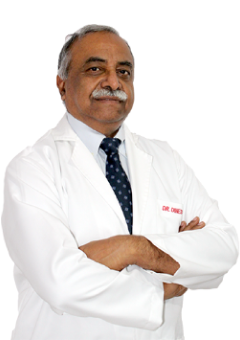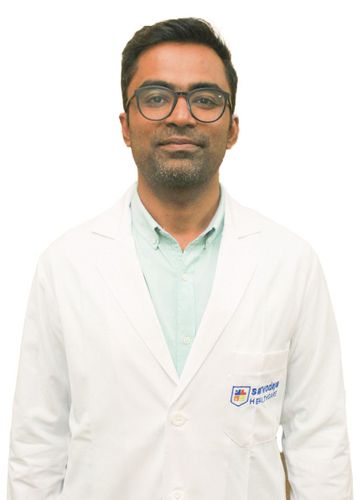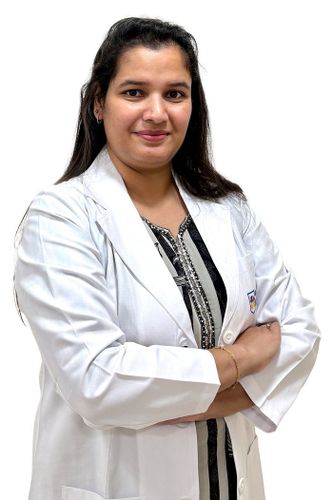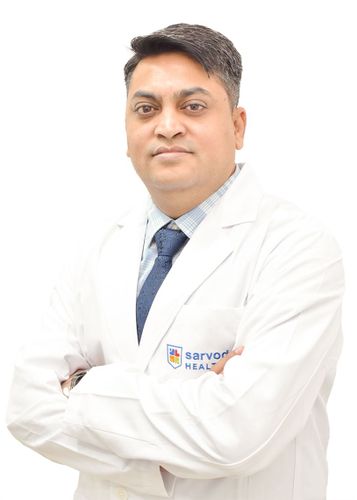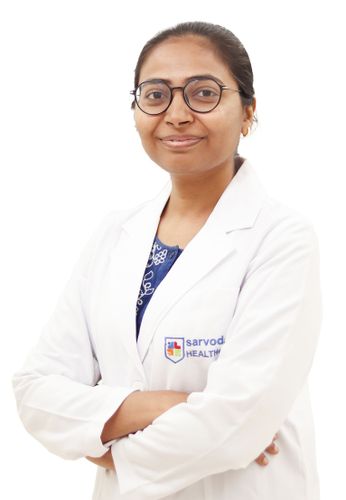Overview
At Sarvodaya Hospital, we deliver compassionate and comprehensive care for patients diagnosed with lung cancer. This condition arises when abnormal cells in the lungs grow uncontrollably, sometimes forming tumours that can spread to other parts of the body.
Early detection, state-of-the-art therapies, and a dedicated team make all the difference. As the best lung cancer treatment hospital in Delhi NCR, we are committed to providing personalised support, advanced technology, and hope at every step.
Symptoms of Lung Cancer
- Persistent cough
- Coughing up blood (hemoptysis)
- Chest pain or discomfort
- Shortness of breath or wheezing
- Unexplained weight loss
- Loss of appetite
- Fatigue or general weakness
- Hoarseness of voice
- Recurring respiratory infections (pneumonia or bronchitis)
- Swelling in the neck or face
- Bone pain
- Headache or neurological symptoms (if metastatic)
Causes of Lung Cancer
- Tobacco smoke (primary and passive exposure)
- Exposure to radon gas
- Air pollution
- Occupational exposures (asbestos, arsenic, chromium, etc.)
- Family history or inherited gene mutations
- Previous lung disease (e.g., tuberculosis, COPD)
- Older age and male gender as risk factors
Diagnosis of Lung Cancer
Diagnosing lung cancer at Sarvodaya Hospital is a thorough process, designed to ensure you receive clear answers and the most effective plan for lung cancer treatment. Our team combines cutting-edge technology with personalised care to guide you every step of the way.
- Medical history and physical examination: Diagnosis begins with understanding your symptoms, risk factors (like smoking or exposure to toxins), and a thorough physical check to detect signs related to lung health or overall well-being.
- Imaging: chest X-ray, CT scan, PET scan, MRI: These imaging tests help detect abnormal areas in the lungs, determine the size and location of any tumours, and assess whether the cancer has spread to lymph nodes or other organs.
- Sputum cytology: Examination of sputum (mucus coughed up from the lungs) under a microscope can sometimes reveal cancer cells, especially useful for centrally located tumours.
- Bronchoscopy with biopsy: A thin, flexible tube is passed through your airways, allowing the doctor to view the inside of the lungs and obtain tissue samples for analysis, crucial for confirming cancer.
- CT-guided needle biopsy: For nodules that are difficult to reach with a bronchoscope, a special needle is directed into the lung tumour using CT images, enabling precise sampling for diagnosis.
- Mediastinoscopy for lymph node assessment: This minimally invasive procedure checks lymph nodes in the chest (mediastinum) for signs of cancer spread, helping accurately stage the disease.
- Molecular and genetic testing: Analysing tumour tissue for specific genetic mutations helps personalise management of lung cancer; certain targeted therapies work best in patients whose tumours have these markers.
- Blood tests and general health assessment: Routine blood tests help evaluate organ function, detect infections or anaemia, and ensure you're healthy enough to undergo the most effective lung cancer treatments in India.
Treatment of Lung Cancer
- Surgery: Depending on your cancer’s stage and location, surgery may involve removing a lung lobe, an entire lung, or a small section. Robotic-assisted surgery offers greater precision, quicker recovery, and minimal scarring. It remains a key curative option for early-stage lung cancer.
- Radiation therapy: External beam radiation targets tumours using precise, high-energy rays. Stereotactic Body Radiotherapy (SBRT) delivers focused, intense doses in fewer sessions, especially effective for early-stage cancers when surgery is not an option.
- Chemotherapy: Anti-cancer medicines are used to destroy tumour cells, often before or after surgery, or as primary management of lung cancer for more advanced or metastatic disease.
- Targeted therapies: These advanced treatments attack specific genetic mutations found in cancer cells, allowing for greater effectiveness and fewer side effects compared to standard chemotherapy. Therapies are personalised through molecular profiling of your tumour.
Prevention & Lifestyle Modification
Our team at Sarvodaya Hospital guides you at every stage, supporting prevention alongside treatment. Here’s how you can protect your lungs and overall health:
- Smoking cessation and avoidance of passive smoke: Stopping tobacco use is the single most important way to lower lung cancer risk. Steer clear of environments where others are smoking to minimise second-hand smoke exposure.
- Workplace hazard protection: Use recommended safety equipment and follow health guidelines if you work around asbestos, silica, chemicals, or other hazardous materials.
- Outdoor air quality awareness: Limit outdoor activities when pollution levels are high, and use masks if necessary to protect yourself from poor air quality, especially if you have existing lung or heart conditions.
- Healthy diet rich in fruits and vegetables: Eat plenty of fresh fruits, vegetables, and whole grains. These foods contain natural antioxidants and nutrients that can help protect against cancer development.
- Routine medical check-ups: Schedule regular health reviews, including lung check-ups with a lung cancer specialist in Delhi NCR if you have risk factors like a smoking history or family background.
- Vaccination and prompt treatment of respiratory infections: Stay up to date on vaccinations (such as flu and pneumonia shots) and treat respiratory infections without delay to maintain lung health.
Pre and Post Lung Cancer Surgery Lifestyle Modifications
Pre-Treatment Modifications- Get a full medical checkup to assess fitness and manage existing conditions.
- Work with a nutritionist to plan high-protein, balanced meals.
- Address any dental issues to reduce the risk of infections during treatment.
- Stop smoking and reduce alcohol intake to improve outcomes.
- Seek counselling or join support groups to manage anxiety and fear.
- Share all medications and supplements with your oncology care team.
Post-Treatment Modifications
- Practice breathing exercises and light physiotherapy to aid lung recovery.
- Eat soft, easy-to-digest, nutrient-rich foods to support healing.
- Start physical activity gradually, based on your energy levels.
- Use prescribed medications or oxygen therapy to ease symptoms.
- Watch for fatigue, breathlessness, or pain and report changes early.
- Stay emotionally supported through survivor groups and counselling.
- Attend regular follow-ups and scans to track recovery and detect recurrence.
Find the best cancer doctors in Delhi NCR, serving Faridabad, Noida, and Greater Noida. Get expert care from Sarvodaya Hospital’s experienced specialists.
- Best cancer doctor in Faridabad
- Best cancer doctor in Noida
- Best cancer doctor in Greater Noida
- Best cancer doctor in Delhi


